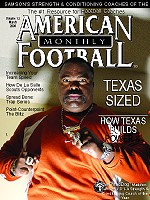AMERICAN FOOTBALL MONTHLY THE #1 RESOURCE FOR FOOTBALL COACHES
Article CategoriesAFM Magazine
|
SCOUTING REPORTby: Mark PanellaAssistant Varsity Football Coach De LaSalle HS, Concord, CA © More from this issue Mark Panella is the Quarterbacks/Receivers Coach at De La Salle High School in Concord, CA and has served on coach Bob Ladouceur’s staff – except for a brief period – since 1989. He has just about seen it all – from the team’s incredible 151 game winning streak to the lows of an unheard of consecutive losses. He also serves as the team’s Video Coordinator. The starting quarterback on the 1984 De La Salle team that went 11-1, Panella spent some time with American Football Monthly on scouting; more specifically, how does the coaching staff scout an opponent and what’s the process in self-scouting… AFM: Can you take us through the process of breaking down your next opponents tape? MP: Once we receive a copy of an opponents game tape we make a few copies including one for Head Coach/Offensive Coordinator Bob Ladouceur who will chart the offense and for our Defensive Coordinator, Terry Eidson. Many of the tapes are still in VCR format and not digital so the dubbing process takes some time. We’ll also make DVD’s for our players. I’ll break down the tape by both formations and down and distance situations. AFM: What is the process in self-scouting Friday night’s game? MP: We’re somewhat traditional and we like to have the entire team review the Friday night game as a unit. The team comes in Saturday morning at 8;30 am and we watch every play from the night before. Coaches will point out how the players performed as each play is shown. While it’s somewhat time-consuming, each play and all 11 players – per play – is critiqued. AFM: When do you review your opponents tape with the team? MP: On Sunday’s…similar to Saturday’s session, we analyze our next opponent – play by play – as a team. We feel this is more effective and gives both the staff and players a sense of the flow of the game. We’re looking for tendencies and what our opponent will do on down and distance situations. But each situation is different and that’s dictated by the score of the game and time remaining; third and long tendencies may be completely different if you’re up by touchdowns or down by two. We do look for blitz packages, zone vs. man-to-man coverage and what coaches do in particular situations. But that’s why we feel it’s important to watch the tape as a team. Time remaining and score are the two fundamental parts of the game to remember when a play is called and watching the entire game together gives us a feel for our opponent. By Sunday our game plan is also in place and we start to implement it each day during the week. AFM: Do you self scout during the week as well? MP: Yes…every day…Monday at lunch time position players will watch game film and be reminded in practice of their own mistakes and what’s needed to correct them before the next game. AFM: What about the opponents QB? How do you scout him? MP: We look for two things – agility and quickness…What is his escapability? We also analyze time and distance. What are his drops and how long are the routes? Is it a three or five step drop and does he throw timing patterns at 5, 8, or, say, 11 yards. In turn, what he does will mean a different read for our secondary and linebackers. We also look at who are their playmakers? Who do they like to get the ball to, especially in long-play situations. It could be a running back or wide receiver… who are the go-to guys? AFM: What about situation tendencies? How much time is related to that? MP: Some, but over the year’s we’ve learned that many coaches become ‘predictably unpredictable.’ By that I mean coaches will go away from their game plan to surprise us, both offensively and defensively. We also make sure that that our defensive players have responsibilities in either man-to-man or zone coverages. AFM: How much time during the week is spent on your opponents special teams play? MP: As much as possible…we usually spend a tremendous amount of time on special teams play. It is really one of the most over-looked areas of the game. We analyze their personnel and see if many starters are a part of special teams play or is it a combination of starters with substitutes. Just think of the difference between starting at mid-field vs. your own 20 yard line. If your opponent is kicking from their 40 and you can make a return to mid-field – as opposed to starting at your own 20 – the advantages of a short field are tremendous. AFM: Are you happy with the digital editing system you use? MP: DSV is a great system for opponent and self-scouting. The editing system and end zone camera are great teaching tools for our players. It’s an awesome tool for De La Salle football. De La Salle Football: a Symbol of Excellence When HC Bob Ladouceur and his staff were first hired at De La Salle, the school never had a winning record. Since that time (1979): • The Spartans had a 151 game winning streak (1992-2003), the most in the annuls of football. • Completed 17 undefeated seasons. • Won five national championships • Have an overall 306-19-3 record (.939%) |
|
| HOME |
MAGAZINE |
SUBSCRIBE | ONLINE COLUMNISTS | COACHING VIDEOS |
Copyright 2024, AmericanFootballMonthly.com
All Rights Reserved




